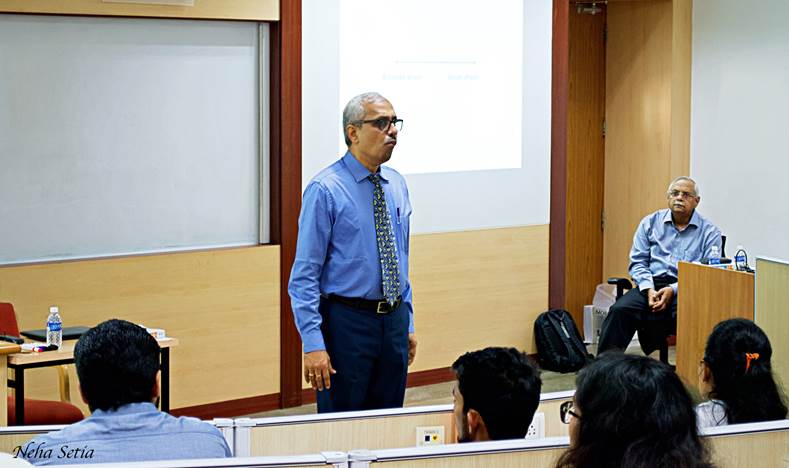As a part of TAPMI’s PGDM-HR’s #HR4HR initiative where various industry experts hold workshops and visit the campus for guest lectures, the latest to visit were Mr. Ganesh Chella and Mr. V.J. Rao, co-authors of the book ‘HR Here and Now: The making of the quintessential people champion’.
Professor Srinivasan Tatachari, Program Chair of PGDM-HR, initiated the lecture by introducing both the guests, post which, they conveyed the agenda for the lecture. The 4 themes set for discussion were:
- What is new strategic HR?
- Bringing people on board
- Managing people- learning, performance, rewards and HR service delivery
- Management and Leadership development
Starting the discussion with the first theme, Mr. Chella spoke about HR now being a strategic function- where one needs to be future oriented and keep asking the question “why- why anything is being done”- essentially meaning that one needs to question the system constantly- what is bigger picture here?

He also spoke about the function now being ‘central’ in nature where it becomes everyone’s job and that the work an HR professional do is very varied and highly contextual- what works in a startup might not work in an established organization. He also stressed on ‘building relations’ with people.
An interesting and refreshing aspect brought out by Mr. Chella was a display of the picture, which when viewed through one perspective, looked as an ‘old lady’, and through the other perspective, the picture looked like a ‘young woman’. It conveyed a simple yet powerful message- HR lies in the eyes of the beholder. It simply depends on your perspective as to how you perceive HR- you can make fun of HR thinking the work is too generic, but the other perspective takes it seriously- giving it due credit as the HR is the function which impacts people’s lives.
Speaking about the 3 domains HR has to master- Mr. Chella said that they were Thinking, Feeling, and Doing– and the ratio depends on where you are in the hierarchy in the organization, “as you move up the organization, the ‘doing’ part increases, however, the ‘feeling’ is always the heart of HR”.
Moving on to the second theme ‘Bringing people on Board’, Mr. Rao asked the students what they thought the theme meant. The students gave some answering revolved creating orientation and induction programs, creating attractive compensation packages etc. Mr. Rao spoke about creating a culture that most people find hard to resist, “but how does one create a culture?”, he asked, “suppose you have a culture of innovation, how did you get there? By recruiting people who’re innovative, and also, always rewarding innovation.”

And how does one ‘plan in uncertain times’ considering how people portfolio, the supply side and the internal labor market has changed? To help us in understanding the concept, he showcased a People Portfolio Management Model. And in an extremely competitive market, remaining attractive is quite a challenge. To overcome the challenge, it’s important that the organization brands itself as attractive in terms of being an employer (called employer branding)- both to its employees and potential candidates, so as to make sure that the organization stays relevant in such a highly competitive market. And in a market where there’s more people than vacancies, it’s important to choose right. Mr. Rao stressed, “learn to say no; the person might be technically competent but might have some behavioral issues,” and it’s important to keep those in mind while recruiting.
Speaking about difference between Indian organizations and foreign organizations and why the former doesn’t usually figure out in various lists of ‘Best places to work for’, Mr. Chella said , “Indian organizations are more value-driven than business-driven, and even then don’t figure out in the lists of ‘Best places to work for’ not because they’re bad but because they don’t usually participate in surveys and are more concerned about their work rather than figuring out in lists.” In a nutshell, they literally mind their own business!
Discussing the first point in third theme ‘Managing people- learning, performance, rewards and HR service delivery’, Mr. Chella explained, “even the learning system has changed,” he explained, “now people are more interested in learning on-demand. It’s the trend of self-learning, interest based, flipped classrooms!”
He also discussed performance management and compensation in length, suggesting that the organizations shouldn’t publish everyone’s salary publicly, but should post the compensation structure and policies. “Why?” one student quipped. “Because people have a tendency to overstate their work and others’ rewards,” he added, “and it’s about understanding your role in performance management.”
The cohort then discussed the last theme for the day- and how things have changed upward mobility promotions because of flatter hierarchy. Suggesting that one should keep growth and development separate, Mr. Rao suggested the students to have career conversations as managers.
During the last few minutes of the lecture, the students interacted with the guests and got their copies of the book signed. Overall, it was an amazing experience to have two extremely learned and experienced individuals interact with the cohort.



Share This